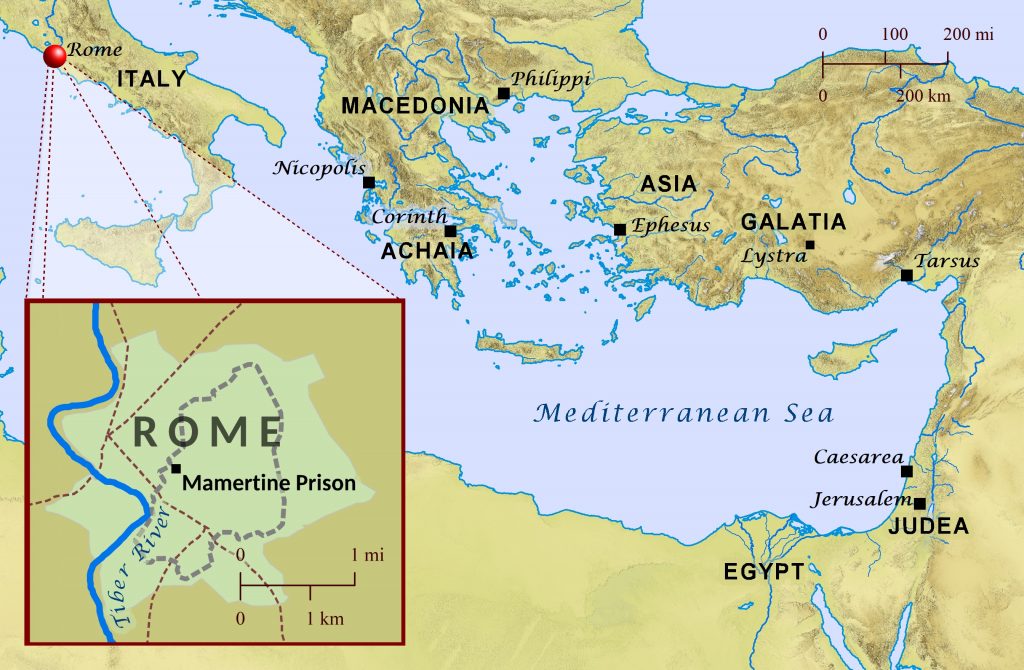Readers’ Version
Literal Version
25:13 King Agrippa wants to hear from Paul
13 Several days later, King Agrippa and his sister Bernice arrived in Caesarea to meet Festus. 14 As they had planned to stay on for a few days, Festus mentioned about Paul to the king, telling him, “There’s a prisoner here that Felix left behind. 15 When I was in Yerushalem, the chief priests and Jewish elders reported to me, wanting a conviction of this man. 16 I told them that it’s not the Roman way to convict someone until they’ve been able to face their accusers and make their defence against the accusations. 17 So as soon as they arrived here, on the very next day I sat on the judge’s bench and ordered the man to be brought in 18 that they were accusing, but they didn’t raise even one of the charges that I expected. 19 Instead they raised some issues about their own beliefs and about some dead person called Yeshua that Paul reckoned was still living. 20 I was puzzled about this debate and asked him if he wanted to be judged about these things in Yerushalem. 21 But Paul appealed to be kept safe from them until he could face the emperor, so I ordered him to be kept in prison until I can send him to Rome.”
22 “I’d quite like to hear him myself,” Agrippa said.
“Well, tomorrow,” replied Festus, “you’ll be able to hear from him.”
23 So the next day, King Agrippa and Bernice formally arrived with all their attendants and entered the auditorium to greet the commanders and the prominent men of the city, and then Festus ordered for Paul to be brought in. 24 Festus started, “King Agrippa and everyone present, observe the prisoner who a multitude of Jews pleaded with me about both in Yerushalem and here, that he doesn’t deserve to still be alive. 25 But I haven’t discovered anything that he’s done that’s worthy of a death sentence, and since he himself appealed to the emperor, I judged that that’s where he should be sent. 26 The problem is that I don’t have any charge to write to my master and so I’ve brought the prisoner out in front of you so that after you examine him, I might have something I can write, 27 because it doesn’t seem logical to me to transport a prisoner to Rome if there’s no charges specified against him.”
14 And as they_were_staying there more days, the Faʸstos placed_before before_the king the things concerning the Paulos saying, certain a_man There_is, a_prisoner having_been_left by Faʸlix, 15 concerning whom of_me having_become in Hierousalaʸm, the chief_priests and the elders of_the Youdaiōns reported, requesting conviction against him, 16 to whom I_answered that it_is not the_custom with_Ɽōmaios to_be_granting any person before or/than the one being_accused, might_be_having to face the accusers and the_place of_defense might_take concerning the indictment.
17 Therefore of_them having_come_together, here, having_made not_one delay, on_the_ next _day having_sat_down on the tribunal, I_commanded the man to_be_brought, 18 concerning whom the accusers having_been_stood they_were_bringing not_one charge, of_which I was_suspecting evil ones.
19 But they_were_having against him some questions concerning their own superstition, and concerning a_certain Yaʸsous/(Yəhōshūˊa) having_died, whom the Paulos was_alleging to_be_living.
20 And I perplexing, the debate concerning these things, was_asking if might_be_wishing to_be_going to Hierousalaʸm/(Yərūshālayim), and_there to_be_being_judged concerning these things.
21 But the Paulos having_appealed to_be_kept himself for the investigation of_the Emperor, I_commanded him to_be_being_kept, until of_which I_may_send_ him _up to Kaisar.
22 And Agrippas said to the Faʸstos:
I_was_wishing also myself to_hear from_the man.
Tomorrow, he_is_saying:
you_will_be_hearing from_him.
23 Therefore on_the day of_next, the Agrippas and the Bernikaʸ having_come with great pageantry, and having_come_in into the auditorium with both commanders and men which in prominence in_the city, and having_commanded the Faʸstos, the Paulos was_brought.
24 And the Faʸstos is_saying:
king Agrippas, and all you_all being_present_with with_us, men, you_all_are_observing this one, concerning whom all the multitude of_the Youdaiōns pleaded with_me, in both Hierousalaʸm and here, shouting not to_be_fitting him to_be_living no_longer.
25 But I grasped him to_have_done nothing worthy of_death, and this one himself having_appealed to_the Emperor, I_judged to_be_sending him.
26 Concerning whom I_am_ not _having any certain to_write to_my master.
Therefore I_brought_ him _forth before you_all, and most_of_all before you, king Agrippas, so_that the examination having_become, I_may_have something I_may_write.
27 For/Because it_is_supposing to_me illogical sending a_prisoner, not also to_signify the charges against him.

